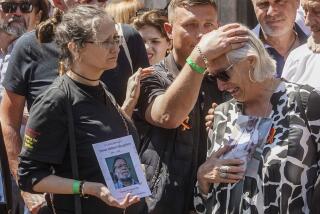Poison Oil Victims Cry for Redress
- Share via
MADRID — For eight years, Arcadio Fernandez has fought crippling pain to seek justice for thousands of Spaniards maimed in a mass food poisoning tragedy in 1981.
The ravages of “toxic oil syndrome”--a mystery disease unleashed when adulterated rapeseed oil was sold as cooking oil--have affected his wife and daughter and left Fernandez’s upper body and hands deformed.
He is among 27,000 survivors of a disaster that left hundreds dead.
“My wife was the worst affected. . . . It began with loss of hair, terrible itching, fever, nausea and loss of appetite,” he said. “Now, it has produced physical malformations, loss of memory, sight loss, involuntary limb movement. . . . I had a lot of pain at the beginning. I still do.”
In cramped offices in the dormitory town of Leganes on the outskirts of Madrid, where 2,000 mainly working-class families consumed the oil, Fernandez heads the Toxic Oil Syndrome Victims’ Assn.
For years, the association campaigned against the dawdling pace of the Spanish legal system, demanding that those charged with the poisoning be brought to trial.
Last year, more than six years after the event, they finally were. Dubbed Spain’s “trial of the century,” it lasted 15 months.
The verdict, delivered in May, took about eight hours to read out and ended in the acquittal of most of the 37 accused. The court found 13 people guilty and handed down sentences for harming public health, fraud and negligence.
Although it ruled that some oil merchants had known that a dye added to the oil could be poisonous, it found none guilty of homicide.
Only two of the 13 convicted went to jail. The rest had already served enough time behind bars before the trial to be freed.
Defense lawyers disputed that the oil had caused the poisoning, blaming tomatoes sprayed with pesticides. The court threw out the argument, but some of those found guilty plan to appeal.
During the trial, enraged victims of the poisoning called for the death of those responsible.
“Those were cries of anguish and impotence at seeing how we have been manipulated,” Fernandez said.
The court fixed compensation of $122,000 for each death and up to $730,000 for those crippled by the disease. But it did not say who should pay.
“I calculate the compensation comes to some 640 billion pesetas ($5 billion),” Fernandez said. “The sentence states 32 million pesetas ($254,000) have been seized from the two oil merchants to pay it.”
Fernandez said the association will appeal the judgment and seek a prompt verdict in a second inquiry, still under way, into the alleged responsibility of government officials in the poisoning. The second trial could be crucial in deciding whether the government picks up the bill for the compensation.
Atty. Gen. Javier Moscoso said the state might not be obliged to pay unless it is found negligent, or a new law is passed. He is also appealing the verdict on undisclosed “technical grounds.”
The government recently put off the question of whether it should pay.
“What we don’t understand is how in a poisoning of this scale . . . not even one bellboy in any ministry is responsible,” Fernandez said.
Minister for Parliamentary Relations Virgilio Zapatero told opposition parties that the government does not want to “prejudge the result of the judicial inquiry or any approach to the administration (the victims) have yet to make.”
The state will continue to provide pensions and income support for those affected, he added.
The state prosecutor at the trial put the death toll from the poisoning at nearly 700. But the court ruled that only 330 deaths could be blamed on the syndrome, with the cause of death--according to its own statistics--not definitely known in another 466 cases.
Fernandez disputes the court’s figure. Last year alone, 62 people died as a result of the poisoning, he said. Of those, the government only recognized six as victims of the toxic syndrome.
More to Read
Sign up for Essential California
The most important California stories and recommendations in your inbox every morning.
You may occasionally receive promotional content from the Los Angeles Times.










